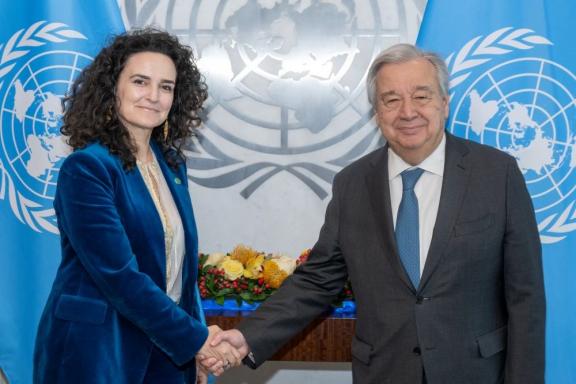The Green Climate Fund (GCF) recently participated at the World Bank-IMF Spring Meetings in Washington, DC and engaged with UN stakeholders in New York, weighing in on discussions about global financial architecture reforms and providing updates on the Fund’s efforts to boost climate finance for developing countries.
As many developing countries struggle to address climate and development challenges amidst food insecurity, poverty, inflation, war, and heavy debt burdens, calls have been loud and clear for reforms to international financial institutions and processes and to significantly scale up climate finance. With COP 29 touted as the ‘finance COP,’ the spring meetings were key meetings in a critical year for climate finance.
Led by the Executive Director, the GCF delegation attended various events, fora and meetings at the spring meetings, engaging with the US government, G20, V20, and partners ranging from the climate funds - Global Environment Facility (GEF), Climate Investment Funds (CIF), Adaptation Fund (AF) - to multilateral development banks (MDBs) to the private sector. The delegation also met with key UN stakeholders, including the UN Secretary-General, in New York.

GCF Executive Director Mafalda Duarte met with UN Secretary-General António Guterres in New York where progress updates were provided on GCF’s efficiency and impact reforms.
The DC and New York engagements were important opportunities for GCF to take part in the global finance reform discussions, particularly as GCF is undergoing reforms of its own to make the Fund more efficient and impactful to better serve the climate needs of developing countries, as part of its 50by30 vision.
Partners and stakeholders were informed about the progress made by GCF on its 50by30 priorities, including the implementation of efficiency measures that aim to deliver climate investments at scale, with the relevant speed and highest impact possible. In addition, GCF and the other climate funds (GEF, CIF, AF) met on the margins of the spring meetings to discuss collaborations and synergies in delivering climate finance to the most climate-vulnerable regions. This has been an ongoing discussion among the four funds since their joint declaration at COP 28 to increase impact and access to climate finance.
While there was broad consensus on the urgent need for reforms in the global finance architecture, there was also agreement on the need for MDBs and the climate funds to work together and for the rapid expansion of tools to drive the scale of climate investments and impact. Many agreed that GCF is crucial in advancing these agendas. Given its tools (e.g., Readiness Programme, Project Preparation Facility) and the diverse breadth of its global partnership network, GCF is well-positioned to enable and catalyse climate finance at scale.
Watch a conversation between the Atlantic Council and Mafalda Duarte, GCF Executive Director, as they discuss the road to COP 29 and mobilising capital for climate action.